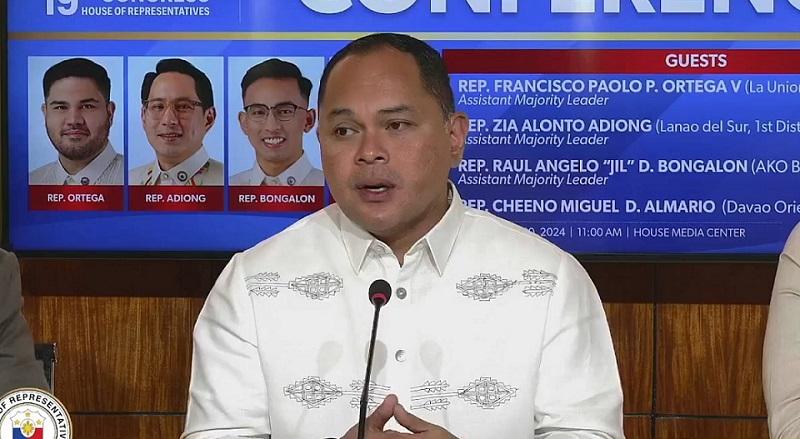Senate should work with House to ensure plebiscite for Cha-cha –solon
By LLANESCA T. PANTI, GMA Integrated News Published March 20, 2024 4:49pm The Senate should work with the House of Representatives in ensuring that the proposed economic amendments to the 1987 Constitution will be subjected to a plebiscite or the people’s vote, House Deputy Speaker and Quezon lawmaker Jay-jay Suarez said Wednesday. The Senate has […]


By LLANESCA T. PANTI, GMA Integrated News
The Senate should work with the House of Representatives in ensuring that the proposed economic amendments to the 1987 Constitution will be subjected to a plebiscite or the people’s vote, House Deputy Speaker and Quezon lawmaker Jay-jay Suarez said Wednesday.
The Senate has yet to approve, even at the subcommittee level, its Resolution of Both Houses 6 (RBH 6), which amends the 1987 Charter by lifting the 40% limit on foreign ownership of public utilities, education and advertising sectors.
The House of Representatives, on the other hand, is expected to approve its counterpart measure RBH 7 on third and final reading today, March 20, the last session day before Congress goes on session break until April 27.
“With the directive of our Speaker [Martin Romualdez], given that there are expected constitutional challenges to the RBH 6 and 7, the prudent way is for us to maximize the Holy Week [break] by discussing…the leadership of the House and the Senate should reconcile on a definitive path how to advance RBH 6 and RBH 7 to the Comelec [Commission on Elections], so this can reach the plebiscite,” Suarez said in a press conference.
“Kasi kung anuman ang napag-usapan ng Kongreso at Senado, dapat po nating ibigay ang kapangyarihan sa tao para makapagdesisyon kung ano ang nararapat para sa ating bansa. Hindi po natin dapat nakawin ang pagkakataong ito sa mamamayang Pilipino,” Suarez added.
(Because whatever the House and the Senate discussed, the authority to decide on what is best for the country belongs to the people. We cannot deny them that opportunity to decide for our future.)
Ako Bicol party-list lawmaker Jil Bongalon agreed, saying that constitutional challenges to the economic Cha-cha will be readily addressed with a united stand from the legislative body.
“The House and the Senate should come together and discuss possible implications of RBH 6 and 7. Constitutional challenge is expected in this kind of unprecedented situation, so we are asking the Senate to make good of its commitment that it will deliver to this administration the measure to amend the restrictive economic provisions of the 1987 Constitution,” Bongalon said, referring to the commitment made by Senate President Juan Miguel Zubiri.
GMA News Online has reached out to the Senate for comment.
RBH 6 explicitly states that the House and the Senate will vote on proposed constitutional amendments separately in a constitutional assembly (con-ass).
The House’s RBH 7, on the other hand, adopted the exact words of Article 17 Section 1 of the 1987 Charter, which reads, “Any amendment to, or revision of, this Constitution may be proposed by: the Congress, upon a vote of three-fourths of all its members.”
This constitutional provision does not expressly provide for joint or separate voting of both the House and the Senate in a con-ass.
The Senate is against joint voting in a con-ass, given that the House’s sheer number of members at over 300 would easily render the Senate’s 24 votes useless.
“Sino namang senador ang boboto na tatanggalin siya? So it’s parang common sense naman ‘yun. Kung tatanggalin ang Senate, hindi boboto ang Senate,” Senator Cynthia Villar earlier said.
(Who among the senators will vote in a method that will unseat them? It is common sense. If you are going to remove the Senate, the Senate won’t get on board with that.) — BM, GMA Integrated News














